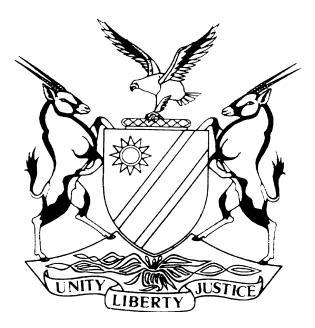R NOT REPORTABLE

HIGH COURT OF NAMIBIA MAIN DIVISION, WINDHOEK
JUDGMENT
Case no: CR: 67/2013
In the matter between:
THE STATE
and
GERSON KHARUXAB ACCUSED
(HIGH COURT MAIN DIVISION REVIEW REF NO. 1371/2013
Neutral citation: State v Kharuxab (CR 67/2013) [2013] NAHCMD 308 (31 October 2013)
Coram: HOFF J and SHIVUTE J
Delivered: 31 October 2013

ORDER

(a) The conviction and sentence are set aside.
(b) The record of the proceedings is remitted to the clerk of the court and the presiding magistrate is ordered to question the accused in respect of the date and place where the incident took place and whether the accused had the required intention when he so assaulted the complainant.

JUDGMENT

HOFF J (SHIVUTE J concurring):
[1] The accused was convicted of the crime of assault with intent to do grievous bodily harm and sentenced to 12 months imprisonment.
[2] I directed a query to the presiding magistrate regarding the conviction.
[3] The magistrate replied as follows:
‘I concede that I should have questioned the accused regarding the date of the allege (sic) offence as well as the full identification of the complainant as the accused only stated the name of the complainant not occurring on the annexure.’
[4] The accused person was questioned in terms of s 112(1)(b) of Act 51 of 1977 as follows:
‘Q. Do you understand the charge against you?
A. Yes.
Q. What do you plea?
A. Guilty.
Q. Did anyone force or threaten you to plead guilty today?
A. No.
Q. Explain to court why you are pleading guilty?
A. Because I stabbed the lady.
Q. Name of the lady?
A. Lolla.
Q. On what part of the body did you stab the complainant?
A. On the shoulder and on the back and on the head as well.
Q. Did you realize when stabbing the complainant with a knife that she could sustain serious injuries as a result?
A. Yes.
COURT: Court is satisfied that you have admitted all the allegations in the charge sheet and you are found guilty of the offence to which you pleaded and you are now convicted.’
[5] The name of the plaintiff in the charge sheet is given as Bonita Nowaseb. It may well be that her nickname is ‘Lolla’ hence the reply by the magistrate that he did not fully question the accused on the identification of the complainant.
[6] I must state the reason for my query was not in respect of the identification of the complainant. In terms of s 92(1)(b) of Act 51 of 1977 a charge shall not be held defective because any person mentioned in the charge is designated by a name of office or other descriptive appellation instead of by his or her proper name.
[7] The charge sheet alleged that the offence was committed on the 1st of June 2013. The magistrate did not question the accused in respect of when the offence was allegedly committed but this failure in my view does not necessarily invalidate the charge (s 92(1)(c). In terms of s 84(1) the provisions as to time and place at which the offence is alleged to have been committed must appear in the charge sheet. The date is included with reference to the time to the offence.
[8] The date or time will however be important where the time constitutes an essential element of the crime for example hunting after sunset with a searchlight, or when proof of another date or period will prejudice the accused on the merits of the defence for example where the defence of an accused is an alibi.
[9] It is however important to state in the charge sheet the place where an incident is alleged to have occurred in order to determine territorial jurisdiction since an accused has the right to plead that a court lacks jurisdiction (s 106(1)(f). The presiding magistrate did not question the accused in respect of the place where the alleged assault took place.
[10] The reason why I required the magistrate is that one of the essential allegations in a charge of assault with intent to do grievous bodily harm is that the assault must be committed with the required intention and thus the questioning by a presiding officer must cover the element of dolus. In this particular instance it is of vital importance to determine why the accused had assaulted the complainant.
[11] In the result the following orders are made:
(a) The conviction and sentence are set aside.
(b) The record of the proceedings is remitted to the clerk of the court and the presiding magistrate is ordered to question the accused in respect of the date and place where the incident took place and whether the accused had the required intention when he so assaulted the complainant.
---------------------------------
E P B HOFF
Judge
----------------------------------
N N SHIVUTE
Judge